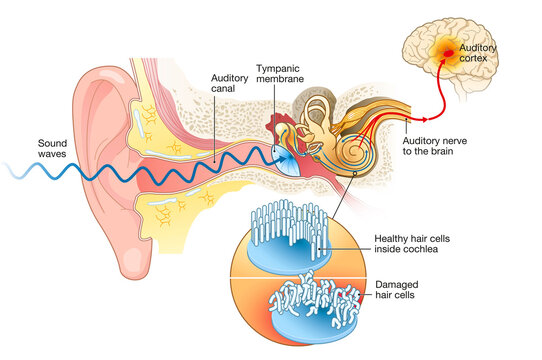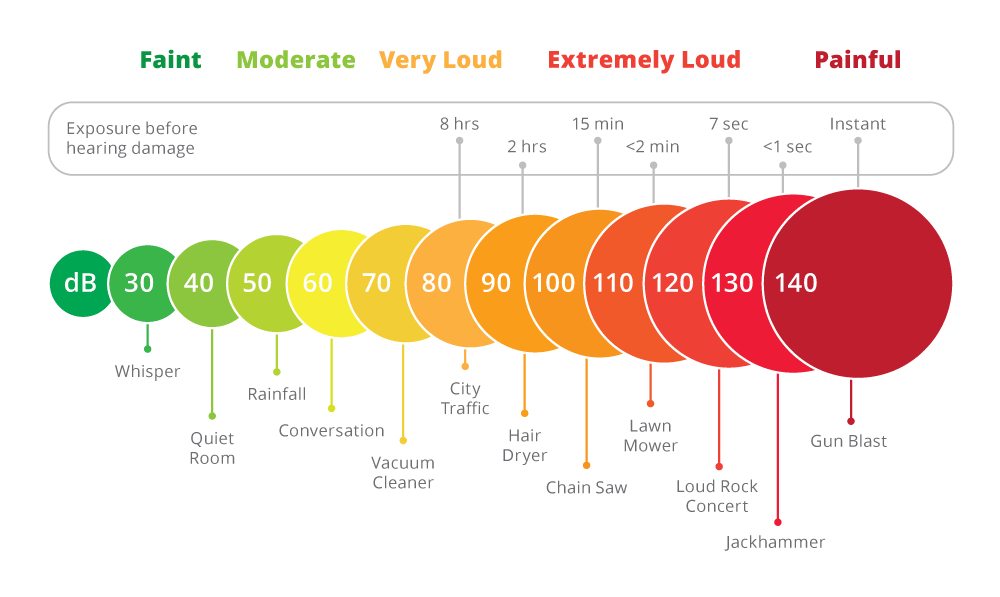Have you ever noticed that, after a concert or using machinery, you have dull hearing or ringing in your ears? This could be a sign of hearing damage.
Within the cochlea of the inner ear, there are tiny hair-like cells which can become damaged from excessive noise. Usually the cells recover, causing the hearing to get better and the ringing to disappear after a few days. However, extremely loud noise or repeated exposure to loud noise can cause the cells to be irreversibly damaged, causing a permanent hearing loss.

There are two types of hair cells in the cochlea: the outer hair cells and the inner hair cells. Outer hair cells are tuned to different frequencies and amplify the sound vibrations traveling through the ear. The inner hair cells convert the vibrations into electrical signals and sends these signals to the auditory nerve and to the brain for the sound to be processed.
Damaged hair cells will not be able to amplify the vibrations or be able to convert the vibrations well, thus causing a loss in hearing.
Are you at risk of noise-related hearing loss?
What determines the risk of noise-related ear damage is how loud the noise is and the duration you are exposed to that noise. For instance, a circular saw is about 94dB and if you are exposed to it for longer than an hour without hearing protection, you are at high risk of hearing damage. It is recommended by Safe Work Australia that you should not be exposed to more than an average of 85dB for 8 hours.
People can often unknowingly go over their safe dose of noise as noise exposure is accumulative. So, even though you have only been exposed to little bit of noise here and then, the addition of a few experiences will compound. Using loud machinery at work, listening to music at the gym, mowing the lawn – the noise adds up throughout the day. So, even though one event on its own would not have been long enough, or loud enough, a few of these events within 24 hours, can do damage to your hearing.
A handy tool by National Acoustic Laboratories calculates your risk for noise-related damage and can be completed here. The Noise Risk Calculator asks questions about the activities you do, both for work and in your spare time, how often you do these activities, and long you do these activities for. With this, it is able to determine your level of risk by accumulating the noise you are exposed and compares this to the acceptable safe exposure limits. The calculator shows how much each of your activities are contributing to your risk, and it also compares your risk level to the average risk level of your age group. It only takes about 5-10 minutes to complete, and you do not need to sign up to anything to see your risk rating – so give it a go!

On “Your Results” page of the Know Your Noise Calculator, there is a tab where you can “Experiment with Your Results” where you can change your answers to some of the survey questions and recalculate your score. This allows you to see how your risk changes based on how often and how long you spend doing the activity!
What can you do to reduce your risk?
If you are at a high risk of noise-related hearing damage, what can you do? One of the most common ways to prevent hearing damage due to noise is through hearing protection. Earplugs and earmuffs are often used to help attenuate noise. They are expected to be used as usual PPE in noisy workplaces, though should also be used when doing loud activities at home such as when using power tools or using a lawnmower. For musicians or those who love listening to live music, musician earplugs with acoustic filters can be used to dampen the noise without losing the music’s sound quality. Taking breaks from the noise and reducing the duration of noise exposure are also effective in curbing noise exposure damage.

If you think you may have a hearing loss or are experiencing tinnitus, contact us and make an appointment for a comprehensive hearing assessment. We also provide custom earplugs and musician plugs to protect your hearing.

